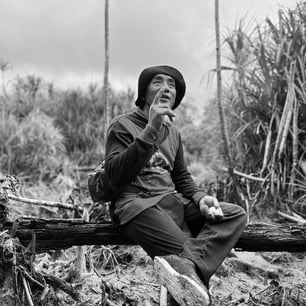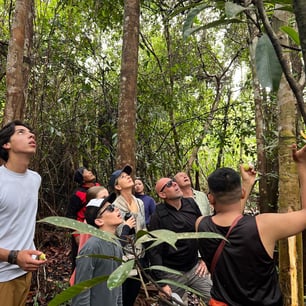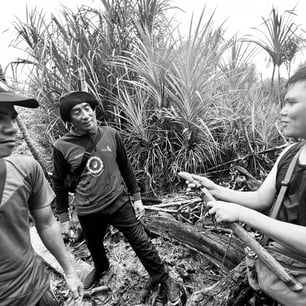
Ficus Conservation Initiative in Central Kalimantan: Protecting Biodiversity Through Sustainable Practices
We help to restore the native forests of Kalimantan. Our team work in Sebangau National Park, The Ficus Conservation Project in Central Kalimantan aims to protect and preserve the region’s diverse and ecologically significant ficus species. Central Kalimantan, located on the island of Borneo, is home to a rich variety of plant and animal life, including several unique and endangered species of Ficus Trees, which play an essential role in maintaining the ecological balance of tropical rainforests. This project focuses on promoting sustainable conservation practices for ficus species, increasing community awareness, and ensuring long-term protection of this important ecological resource.
Project Objectives:
Conserve Ficus Biodiversity
To protect and conserve native Ficus species in Central Kalimantan, particularly rare and endangered varieties, through habitat restoration, seed propagation, and monitoring of ficus populations.Promote Sustainable Land Use Practices
Encourage sustainable agricultural practices among local communities to reduce deforestation and forest degradation, ensuring the protection of ficus ecosystems and surrounding habitats.Raise Community Awareness and Involvement
Engage local communities in the conservation of Ficus species, educating them about the ecological importance of these trees and how their sustainable management benefits both the environment and the economy.Support Ecotourism Development
Foster ecotourism activities that highlight the importance of ficus conservation and provide economic benefits to local communities while promoting responsible tourism.Conduct Scientific Research
Support ongoing research to better understand the ecology of ficus species, including their role in supporting biodiversity, soil health, and carbon sequestration.
Project Components:
Ficus Species Survey and Monitoring:
Conduct a comprehensive survey of ficus species across Central Kalimantan to identify key areas of distribution and assess the health of existing populations.
Use modern technologies (e.g., GIS mapping, drone surveys) to track ficus populations and detect areas under threat from deforestation or land conversion.
Habitat Restoration and Protection:
Partner with local stakeholders, including forest rangers and community groups, to restore degraded forest areas that are home to ficus species.
Establish protected zones where ficus populations can grow and thrive without the pressure of logging or agricultural expansion.
Community Engagement and Education:
Organize workshops, seminars, and community events to educate locals on the value of ficus trees, their ecological roles, and sustainable farming practices.
Implement a local stewardship program, where community members actively participate in planting, monitoring, and maintaining ficus populations.
Seed Bank and Nursery Development:
Create a seed bank to conserve ficus seeds and propagate them for restoration efforts.
Set up a local nursery to grow ficus seedlings that can be planted in the wild or used for community-based reforestation projects.
Ecotourism and Sustainable Livelihoods:
Develop eco-friendly tourism trails that lead visitors through ficus-rich forest areas, promoting sustainable tourism practices that generate income for local communities.
Create educational programs that connect tourists with conservation efforts and raise awareness about the importance of ficus species.
Research and Monitoring:
Collaborate with universities and research institutions to study the reproductive biology, growth patterns, and ecological benefits of ficus species in the region.
Regularly monitor the success of conservation interventions and make data-driven adjustments to the project.
Expected Outcomes:
Protection of Ficus Biodiversity:
Successful establishment of protected areas and restored habitats, contributing to the preservation of native Ficus species and the broader biodiversity of Central Kalimantan.Improved Land Management Practices:
Increased adoption of sustainable land management practices by local farmers and communities, reducing deforestation and promoting long-term ecological health.Economic Benefits to Local Communities:
Creation of alternative livelihoods through ecotourism, sustainable agriculture, and involvement in conservation activities, leading to improved economic stability for local populations.Increased Public Awareness:
Enhanced understanding of the importance of ficus conservation among local communities, tourists, and broader society, fostering a culture of environmental stewardship.Long-Term Ecological Monitoring and Research:
Ongoing research and data collection will provide valuable insights into the ecology of ficus species and inform future conservation efforts across Borneo and other tropical regions.
Project Partners and Stakeholders:
Local Communities and Indigenous Groups – Collaborating in conservation efforts and benefiting from ecotourism and sustainable agricultural programs.
Kalimantan Forest Rangers and Environmental Agencies – Providing support for habitat protection, monitoring, and enforcement.
Academic Institutions – Collaborating on research related to ficus species and their role in ecosystem health.
NGOs and Environmental Organizations – Providing funding, expertise, and advocacy for ficus conservation.
Tourism Operators – Partnering in the development of sustainable tourism initiatives in Central Kalimantan.
The Ficus Conservation Project in Central Kalimantan presents a unique opportunity to protect vital biodiversity, empower local communities, and promote sustainable practices in one of the world’s most ecologically important regions. By focusing on the conservation of ficus species, this initiative will help safeguard the rainforest ecosystem of Central Kalimantan for generations to come.



